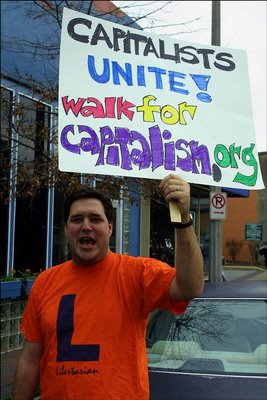Wednesday, July 19, 2006
Whatever Happened to the Class War?
 Two related articles in the Guardian today tell us much more about the state of political funding and Labour's related policy directions. David Hencke tells that both parties are heavily in debt after spending £30m on last year's election. Labour now owes £27m and the Tories £18m and both 'are being kept afloat by millionaires who have lent parties alost £30m on favourable terms and are not expecting to be paid back immediately.'
Two related articles in the Guardian today tell us much more about the state of political funding and Labour's related policy directions. David Hencke tells that both parties are heavily in debt after spending £30m on last year's election. Labour now owes £27m and the Tories £18m and both 'are being kept afloat by millionaires who have lent parties alost £30m on favourable terms and are not expecting to be paid back immediately.'Peter Wilby however provides some fascinating deeper analysis. He notes a tipping point in the 2001 election when business contributions to Labour's campaign exceeded donations from the unions. The payback, he suggests has been in the coin of ways of rendering far more money out of public services than the Conservatives could ever have contrived through market solutions. PFI offers private capital a 'guaranteed income stream for running(public) services over 20 to 30 years.
So lucrative and risk-free are these deals that many companies that entered early PFI contracts could refinance their borrowings at much lower rates of interest, thus boosting profits to stratosperic levels' [in some cases over 100% returns] Wilby points out that capitalists of even the reddest tooth and claw could not have dreamed of doing so well out of setting up schools and hospitals in a 'genuinely open and competitive market with all its risks of failure.'
Furthermore huge sections of public service management have been virtually handed over to consultants at a sky-high cost of £70bn. 'Given' comments Wilby, 'how Labour has turned the public services into a cash cow for the private companies, there was never much need to sell peerages.' Wilby doubts if union power-even in the mid seventies- exerted much political power beyond employment law but asks, pertinently, why it is possible for a non British citizen, like Rupert Murdoch, 'to dictate government policy, but not acceptable for the representatives of millions of employees to be heard?'
Comments:
<< Home
Bloody hell... Ithought that T-Shirt said 'Wank for Capitalism' and was inspired by this post I referred people to today:http://www.24dash.com/content/news/viewNews.php?navID=47&newsID=8284
Bob
Sorry to disappoint you; I just wanted a visual image which expressed the idea of capitalism. But maybe your version, though mistaken, was better.
Sorry to disappoint you; I just wanted a visual image which expressed the idea of capitalism. But maybe your version, though mistaken, was better.
This is a sad indictment of the Labour Party. Class war ended in defeat in 1985 when the miners returned to work.
Post a Comment
<< Home




